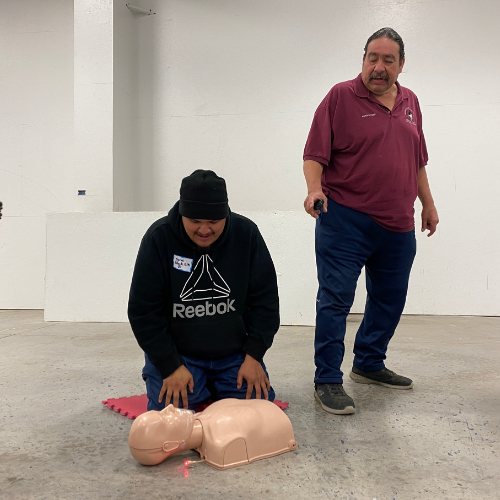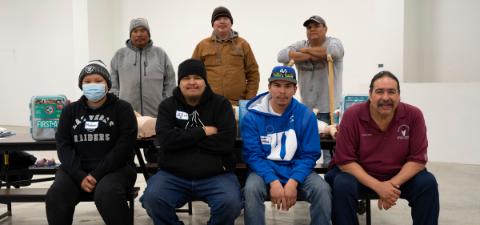Harold The Helper
 Harold instructs Syrus how to get air back into the lungs of an unresponsive victim
Harold instructs Syrus how to get air back into the lungs of an unresponsive victim
Harold Tiger of the Cheyenne River Sioux Tribe has always felt a calling to help people. Inspiration struck in his youth when he traveled with his mom, who taught life-saving classes. In fact, his Lakota name, Wičhóni Wawókiya, means “helper of life.”
Harold says that Partnership with Native Americans (PWNA), through its Northern Plains Reservation Aid (NPRA) program, allows him to extend his reach and give emergency medical training to tribes in the Northern Plains.
An emergency medical technician of 32 years, Harold spends most of his time leading safety classes. You will usually find him teaching a Community Emergency Response Team (CERT) class, empowering tribes to take care of their own. Harold teaches everything from lifeguard safety to first aid and the operation of emergency vehicles.
“That’s my goal, to spread my education as far as I can in Indian Country because we’re lacking,” Harold says. “This training is going to save lives. It is going to make a difference between life and death.”
CERT classes are for all ages, but Harold especially enjoys teaching children. He says that kids often swim in any body of water that they can find, making their emergency preparedness a top priority.
Many Native communities have limited access to health care, transportation, and emergency response services. In addition, Native and Alaska Native infants are 2.7 times more likely than non-Hispanic white infants to die from accidental deaths before they reach 1 year old.
 From left to right: Bruce, Jerrold, Emerald, Madonna, Syrus, Vincent, and Harold.
From left to right: Bruce, Jerrold, Emerald, Madonna, Syrus, Vincent, and Harold.
Friends like you can help tribes prepare for emergencies by funding events like the first-aid training recently conducted by Harold in Wounded Knee, South Dakota. There, a group of Oglala Sioux learned the latest CPR methods for adults, children, and infants. Participants paired off and practiced a simulation of finding an unresponsive person. The first responders gave compressions, kept the air flowing, and shocked the CPR doll with an AED until they got a pulse.
Harold says communication is key when someone needs medical assistance, and in the event of a disaster, it is important to write down everything you see and when. He also suggests keeping a phone tree to support tribal communication.
The trainees had varied reasons for becoming trained in first aid. Syrus has a pacemaker, as does Bruce’s brother. Bruce described how his brother can only take small loads of laundry up the stairs; otherwise, he experiences heart problems. Jerrold works in corrections and seeks out training refreshers often, saying, “Every time I go, I learn something new.”
NPRA prioritizes year-round disaster relief as well as emergency preparedness through asset and resource mapping, collaborative networking, and first responder training. Every donation you make helps fund solutions that are meaningful, much needed, and lifesaving for those living on Northern Plains reservations.